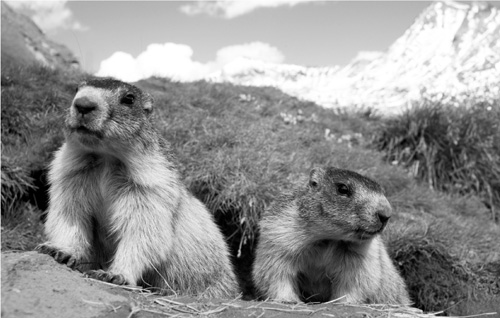Animal BehaviorBehavioral Ecology |
What is hibernation? |
Hibernation (from the Latin term hiberna, meaning “winter”) is a period of dormancy practiced by animals to overcome wintry environmental conditions. Hibernation involves a decrease in metabolic rate (the rate of burning calories), heart rate, respiration, and other functions (such as urine production and rate of digestion). These rates dive so low that the animal’s body temperature approaches that of its surroundings. Small animals whose increased metabolic rate forces them to find an alternative to starving during the winter months are more likely to hibernate than larger animals.

Alpine marmots, which live in Europe, hibernate up to eight months every year!
